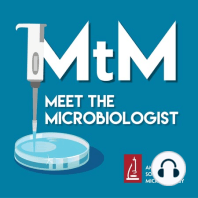16 min listen

MTS15 - Kathryn Boor - The Science of Foodborne Pathogens
MTS15 - Kathryn Boor - The Science of Foodborne Pathogens
ratings:
Length:
13 minutes
Released:
Jan 21, 2009
Format:
Podcast episode
Description
Dr. Kathryn Boor is a professor and chair in the Food Science department at Cornell University, where she’s director of the Food Safety Laboratory - a biosecurity level 2 laboratory that facilitates research on foodborne pathogens. Her particular research interests lie in the “how” and “why” of pathogens and spoilage microbes in food. Boor is also the director of the Milk Quality Improvement Program – a program funded by New York state to monitor and make recommendations to improve the quality of milk in the state.
When I think about the complicated way dairy products come to be on the shelf in my grocery store – farmers use machinery to extract milk from an animal that lives in a barn or a field; the milk is piped through long tubes to a tank on a truck that conveys the product to a plant that processes and divvies it up; the bottles and packages are put on another truck and carted to the store – it seems like a wonder dairy is ever safe to eat. But dairy is safe: CDC data indicate that less than 1% of foodborne illness outbreaks in the U.S. involve dairy products1 2 .
Dr. Boor’s primary interest lies in Listeria monocytogenes, one of the few pathogens that is a problem in dairy, and most people who’ve heard of it associate it with unpasteurized soft cheese or cold cuts. Listeriosis is not as common or familiar as some other foodborne illnesses, but it is more often fatal than salmonellosis or botulism, and in a pregnant woman even a mild case can be deadly for her fetus. Dr. Boor’s research focuses on how this so-called “simple” organism is able to persist in some foods and overcome the stress of refrigeration and stomach acid to not only survive, but to make us really sick.
In this interview, I asked Dr. Boor about how she came to this particular niche in science, whether pasteurization is any better than keeping milk from getting contaminated in the first place, and what her trained eye for food safety looks out for when she’s buying food.
When I think about the complicated way dairy products come to be on the shelf in my grocery store – farmers use machinery to extract milk from an animal that lives in a barn or a field; the milk is piped through long tubes to a tank on a truck that conveys the product to a plant that processes and divvies it up; the bottles and packages are put on another truck and carted to the store – it seems like a wonder dairy is ever safe to eat. But dairy is safe: CDC data indicate that less than 1% of foodborne illness outbreaks in the U.S. involve dairy products1 2 .
Dr. Boor’s primary interest lies in Listeria monocytogenes, one of the few pathogens that is a problem in dairy, and most people who’ve heard of it associate it with unpasteurized soft cheese or cold cuts. Listeriosis is not as common or familiar as some other foodborne illnesses, but it is more often fatal than salmonellosis or botulism, and in a pregnant woman even a mild case can be deadly for her fetus. Dr. Boor’s research focuses on how this so-called “simple” organism is able to persist in some foods and overcome the stress of refrigeration and stomach acid to not only survive, but to make us really sick.
In this interview, I asked Dr. Boor about how she came to this particular niche in science, whether pasteurization is any better than keeping milk from getting contaminated in the first place, and what her trained eye for food safety looks out for when she’s buying food.
Released:
Jan 21, 2009
Format:
Podcast episode
Titles in the series (100)
MTS13 - Joel Sussman - Proteopedia.org and Intrinsically Unstructured Proteins: Joel Sussman, Ph.D. is a professor of structural biology at the Weizmann Institute of Science in Israel. In his research, Dr. Sussman is interested in elucidating the structures and functions of proteins, particularly those involved in the nervous system. by Meet the Microbiologist